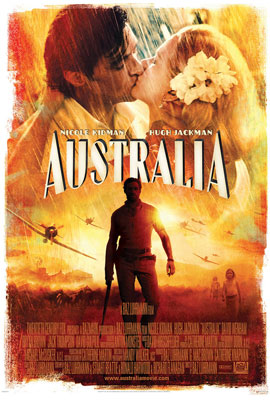There’s a band of disgruntled filmgoers out there who miss the way movies used to be. Hollywood was once a land of Selznicks, Mayers and Bogarts. A cigar-chomping executive from the golden era would have easily accepted the pitch for Baz Luhrmann’s new epic film, “Australia.” I can just imagine, “Forget the script, just get me the best attractive leads in town, get them to kiss in the rain in Technicolor, throw in some airplanes dropping bombs, bring me DeMille and we got ourselves a picture!”
Oscar-winning epics like “Gone with the Wind” and “From Here to Eternity” are sure to be referenced in comparison to “Australia.” It’s undeniable that Luhrmann had those kinds of films in mind when he crafted his own Aussie adaptation. This is the kind of movie that was made for the audience that misses the way movies used to be made; the colors, scenery and kisses all evoke memories of classic Hollywood love stories. After making the stylistically inventive “Moulin Rouge,” Luhrmann’s fan following may be surprised to find that his new movie is – gasp – restrained. There are no pop songs clashing with mythos here; it is all classically shot like a 1930s melodrama.
The film’s Australian version of Scarlett O’Hara is played by Aussie-born actress Nicole Kidman. She plays Lady Ashley, a wealthy British socialite who goes to Australia to manage her dead husband’s cattle ranch. The evil rancher named King Carney would like nothing more than to snatch up all the land and gain a monopoly on the meat industry, as the world is on the brink of World War II and the army will need to feed its soldiers. Ashley poses a threat to her competitor because of her decision to take back control of her ranch. To protect her land and cattle, she is aided by a cattle driver simply named Drover. He is the film’s Aussie version of Walker Texas Ranger, played by Australian-born Hugh Jackman. Together, Drover and Ashley bond with an Aborigine child and set off to deliver the cattle from the ranch to the army.
“Australia” feels as if it would be more comfortable stretching its arms and legs to a reasonable length. This is a mini-series confined to a 165-minute movie. Sometimes a wide variety of elements and tones can strengthen one another by providing contrast, but not here. This movie feels episodic and works stronger in parts rather than as a cohesive whole. The comedic elements in the beginning are so goofy that it’s hard to take the rest of it seriously when the film shifts tones. It attempts to package together “The African Queen” humor with “Gone With the Wind” catharsis, and they simply don’t mesh. As a tribute to classic Hollywood, the film works, but as a story, it is weakened by its unbalanced episodic nature. At least there‘s the kiss in the rain.
Australia is rated PG-13 for some violence, sexuality and brief strong language.







